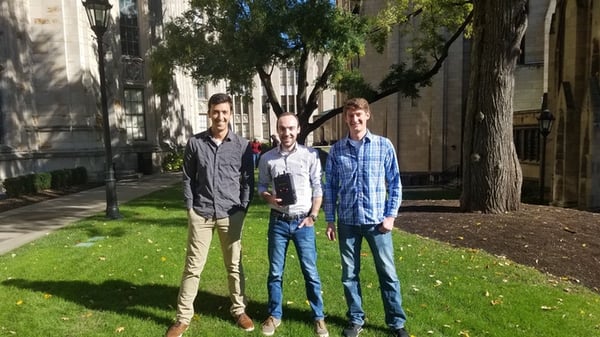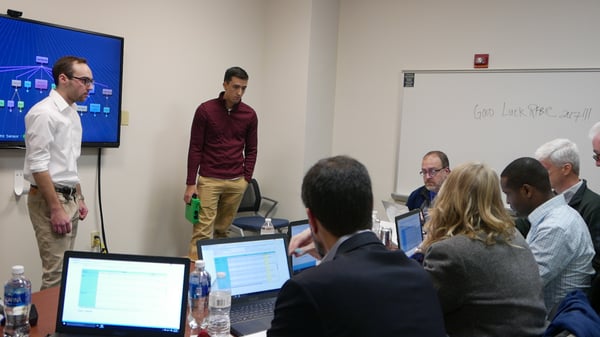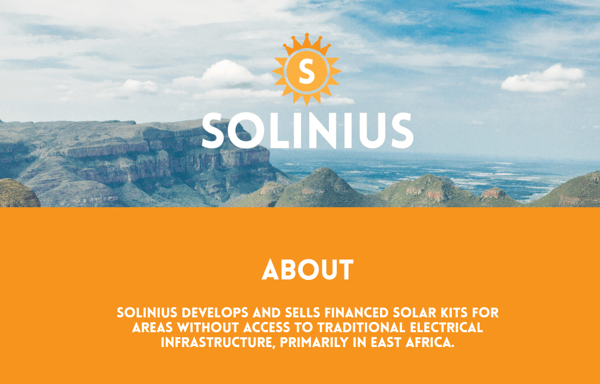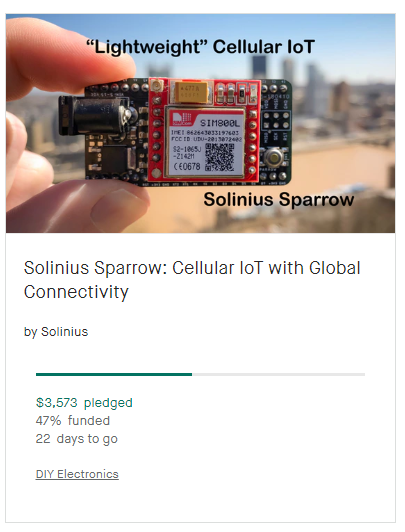Social entrepreneurship doesn’t necessarily mean an enterprise that does not make a profit. In the case of a Pitt student startup dedicated to unlocking solar power’s potential in the developing world, organizing as a Public Benefit Corporation is designed to help do well by doing good. We welcome Jay Murray, CEO of Solinius, to our blog to introduce his company and the Kickstarter campaign he and his colleagues have launched around the cellular IoT development board they created to drive their system.
Three Swanson School of Engineering students, a handful of Innovation Institute programs, and too many late nights to count have culminated in the startup you see today. Solinius was born out of a conversation between roommates in late 2015.

As it happens, the Indian government, much like our own, is very interested in local economic development and pushing companies to purchase Indian-made photovoltaics, the science behind the most popular form of harnessing solar energy. So much so that they’ve instituted subsidies. This fact got me thinking about how these government subsidies could be used to build a decentralized solar panel system, offering the most impoverished and low-income farmers and rural business owners access to light and electricity.
According to The Rockefeller Foundation, just obtaining access to such a resource can increase one’s annual income by 39%. The problem was, and still is, that up-front capital for such a product doesn’t exist, nor does money exist for the one-time grid connection fee. The solution: collateralized financing through a modular solar kit.
Enlisting the help of longtime friend and former next-door neighbor in Forbes Hall, Ben Stutz, we looked to the Innovation Institute’s annual Randall Family Big Idea Competition for funding and mentorship. Ben knew the technology and I hammered away at the business side of things.
The product and market have gone through many revisions since that pivotal weekend in November 2015, but the vision and goal remain the same: provide safe and affordable access to electricity in developing areas.
We won one of the cash prizes in the 2016 Big Idea competition. More importantly, the exposure and networking afforded the team the opportunity to build a working prototype. One of the judges was Mike Matesic of Idea Foundry. Mike later helped to fund Solinius’ first prototype and took an immense leap of faith into the team’s supposed know-how.
Through prototype development, Nick Faughey, now Solinius’ CTO, was brought on board as a contracted database engineer. Over a year later, Nick has written (and re-written) 99% of the code stack and is an invaluable asset to the team.
The summer of 2017 saw Solinius go through the Innovation Institute’s Blast Furnace student accelerator, Cohort 5. Between work sessions and guest speakers, we settled into the Pittsburgh startup ecosystem and worked with other new players like Four Growers and ArriveXP.
Being three white guys (to put it frankly) from Pittsburgh, and no ties to Africa or India, it was an up-hill battle to develop connections and learn the market landscape. There are already dozens of other solar products out there, from single lanterns to whole home installations. However, based on our research and the feedback we’ve received, we knew they had missed the mark. Places like Uganda offer existing solar sales infrastructure, with distributors setting up rudimentary financing, but they have no way to effectively collect payments on a regular basis, track consumer use of the kit, and make sure that a customer pays on time and in full over the full period of financing.
With Solinius’ “Finance Ready Solar Charge Controller,” otherwise known as the Aardvark, distributors pair their panels and batteries to the central unit to build a full solar kit.
Using our cloud console, they input new sales and track data from existing sales. We also give distributors access to “Actionable Insights” when we believe they could benefit from the data collected. If a customer has been paying on time and in full via the three accepted mobile payment networks, we recommend the distributor speak to the client about future upgrades. If we’ve seen anomalies in use, we recommend the distributor send someone out to check if maintenance is needed. Should the customer not make a scheduled payment, all parties are notified, and electricity access is halted while the situation is remedied.
By allowing distributors to pair the batteries and panels they already have access to, we allow them to source from local providers. As a Public Benefit Corporation, it’s very important to us to make sure that local economies aren’t commandeered by us western-based companies.
Instead, we want to bolster the local economy through enabling technology, and at the same time allowing families to access to safe and affordable light and electricity.
With two Kampala-based employees and almost a dozen letters of intent from distributors across Uganda, Solinius is well on its way to accomplishing the goals we initially set out to achieve. But with over a billion individuals without power, there’s a long road ahead.
Our controller is enabled through a cellular connection, using a technology we call “Sparrow”. To fund our ongoing operations in Uganda, we have broken the Sparrow out and are letting it fly on its own (pun intended!).
Sparrow is a 2G cellular Internet of Things (IoT) development board meant to be easily scaled to thousands of units. We couldn’t find a solution to easily speak with our deployed kits, so we build Sparrow. Right now, Solinius is running a Kickstarter campaign for the Sparrow. Over 30 days, we are looking to raise $7,500, with any profits of the project going to our Ugandan operations.
You can check out our Kickstarter campaign here: https://www.kickstarter.com/projects/2006382206/solinius-sparrow-cellular-iot-with-global-connecti?ref=aq69kq

